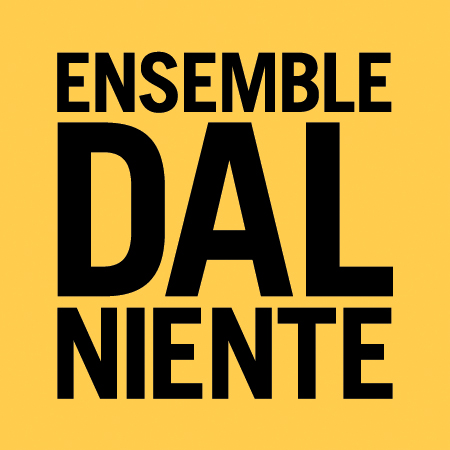By Andrew Nogal, Oboist
Now that I’ve slept for approximately 48 hours straight and washed six loads of all-black laundry – the staple of the freelance musician’s wardrobe – I am ready and eager to reflect on the Ear Taxi Festival, no doubt the boldest and most daring musical project I have watched unfold during my many years as a musician in Chicago. From my unusual perspective, Ear Taxi was a triumph of both imagination and execution. While I didn’t get to experience any Ear Taxi events purely as an audience member, I can offer a behind-the-scenes look at my preparation as well as a firsthand account of the convivial backstage vibe.
I performed not only on Dal Niente’s Friday night set, but also on Sunday afternoon as soloist with DePaul’s Ensemble 20+ (conducted by our own Michael Lewanski) and with the CSO’s MusicNOW Ensemble on Monday evening. In the week leading up to the festival, I had several twelve-hour workdays, during which I squeezed two or three rehearsals into days already packed with my usual teaching commitments, practice schedule, and reed-making routine. (I don’t drive a car, and I am grateful to the CTA and Metra for delivering me to almost every engagement on time!)
Months in advance, I knew that Ear Taxi would push me to my emotional and physical limits, and so I made the drastic, uncharacteristic decision to limit my caffeine intake during the festival. If you know me well, you know that this is a big deal. It was in Darmstadt in 2012 that I transformed into the kind of person who drinks coffee at all hours of day and night, and since then, my life has been an avant-garde pinball machine: I drink coffee, I bounce off the walls, I play the oboe. Ding ding ding, new high score! I couldn’t afford to have my nerves or health fail me during Ear Taxi, though, and I trusted that the music-making would be invigorating enough. A tiny cup of coffee at breakfast would be my only caffeinated ballast for about ten days, withdrawal headaches be damned.
That turned out to be a really good decision, because I was right: Ear Taxi enveloped me in positive, productive musical energy of a kind I certainly haven’t felt since I was a student. I was inspired to perform well not just for myself, but on behalf of the entire creative community of which I am a proud and active part. We were given a big, resonant stage on which to stand in front of a large, curious audience. It’s unfortunately rare as a performer of contemporary music to “get presented,” i.e., to have much of the unglamorous but essential legwork of concert production (fundraising, marketing, schlepping chairs and stands, transporting gear, selling tickets) offloaded from us musicians. Festival curators Augusta Read Thomas and Stephen Burns, festival manager Reba Cafarelli, and their whole staff and volunteer team are to be commended for following through on such a comprehensive vision of what this festival could be. Thanks to the host venues, too, for providing exceptional and comfortable spaces in which to work intensely.
And what about the music? It would be impossible to make any sweeping generalization about the programs or artists showcased at the festival. Two possible (among infinite) takeaways from the festival’s programming are that today’s composers and performers are exceedingly willing and able to engage thoughtfully with the music of the past and, secondly, that hostilities have perhaps softened between composers formerly seen as representing rival schools.
Personally, I thought that a lovely classicist thread tied together Ensemble 20+’s two selections: the Oboe Concertino by Bernard Rands set me up as a rhapsodizing protagonist backed up by the band from Ravel’s Introduction and Allegro. Next on the program, Eliza Brown’s watery, whispery A Soundwalk with Resi conjured the spirit of Richard Strauss.
On Monday night, Katie Young’s new piece where the moss glows received its world premiere at the festival’s finale, which doubled as the first CSO MusicNOW concert of this season. It stands to reason that the Chicago Symphony’s average concertgoer has probably never engaged with a piece like this – gnarly and knotted and whirring – performed live before. Dal Niente’s guitarist Jesse Langen described it with his usual aplomb: “maybe you’re somewhere in Portugal with a radio that’s 150 years old with these gigantic tubes coming out the back, and you tune in a faint signal from Dresden and it’s Wozzeck… that’s what this piece sounds like.”
Over the course of the festival, I overheard composers of what we’d generally call post-minimal music praising compositions that might get slammed elsewhere for being inaccessible or academic. It turns out that different listeners bring different life experiences to their seats in the concert hall, and those are hardly ever cut and dried; sounds that one person drably brushes off as “academic” might remind someone else of beats blasting at a warehouse rave. (Yes, I heard these two differing reactions to the exact same piece).
If you attended many of the concerts at Ear Taxi, first of all, thank you for being there, and second, I hope you weren’t expecting to love or connect with everything you heard! Even as a performer, I’m not crazy about all the music I play. Maybe that sounds controversial or surprising, but I believe it’s just a natural part of the great privileges and responsibilities of doing my job. It’s a meaningful and important challenge to try to give new music its best possible first (and second and third) performance. I cared so much about my concerts at Ear Taxi, I was willing to give up coffee for them.

